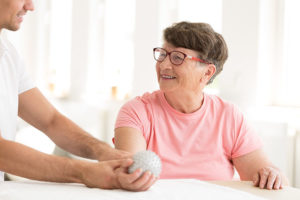 After a stroke, many people ask the question “What do I do now?” No one expects to have a stroke, and it can be devastating when it happens. Everyone has a different length of recovery, and everyone typically worries about the same things. Whether you or your loved one has suffered a stroke, there are several important things to know about the recovery process.
After a stroke, many people ask the question “What do I do now?” No one expects to have a stroke, and it can be devastating when it happens. Everyone has a different length of recovery, and everyone typically worries about the same things. Whether you or your loved one has suffered a stroke, there are several important things to know about the recovery process.
Use Your Primary Doctor
Immediately upon leaving the hospital after a stroke, arrangements should be made for the patient to see their primary doctor. The physician will give you invaluable information on how to stay healthy, and ensure proper rehabilitation. He or she will inform you about treatment options, as well as any other specialists that you may need to see. Your primary doctor is one of your best resources in this difficult situation.
Reduce the Risk of Additional Strokes
The main concern of the stroke survivor and their families is the risk of having repeat strokes. Talk to your diet about diet, exercise, medications, and a course of treatment. Make sure he or she outlines exactly what you need to do, and certainly don’t hesitate to ask questions! If there is anything that you are unclear about, ask for clarification. Ask your doctor for recommendations about what your daily routine should be in terms of reducing the risk of repeat strokes.
What Does Recovery Depend Upon?
Since no two situations are alike, this varies from person to person. Some people may recover in a few months, while it takes others several years. That being said, the factors that your recovery depends upon are: the percentage of the brain that was affected by the stroke, the course of treatment and rehabilitation that the patient receives, and, most importantly, the motivation of the patient to take the necessary steps toward recovery. Family members need to check in regularly with patients and make sure they are eating healthy, getting proper exercise, and enough sleep. Make sure that the patient is following all of the doctor’s orders exactly in order to make the road to recovery as efficient as possible.
The Importance of Repetition
Many people, both patients and family members, may not realize just how important repetition is when recovering from a stroke! Neuroplasticity is rebuilt, and the brain is rewired to make new connections. It is vital that the patient not grow frustrated with the process. At times, even simple tasks need to be relearned after suffering from a stroke. The patient will benefit from exercises such as repeatedly lifting a small weight. Ask your doctor which exercises you should be doing on a regular basis that will have the most benefit.
Know How Much is Enough
While exercise is important after experiencing a stroke, the patient still needs to pace themselves. Light exercises, such as a walk around the block, are highly effective for stroke survivors. The patient should never push themselves to do more than they are comfortable with. If you feel that you need a day to rest, certainly take it. There is no benefit in overdoing it, so have realistic expectations of what you should or should not do.
Recovery is Possible
Positive thinking is of utmost importance after a stroke. Patients and family members should never make comparisons between two or more people. Remember, every stroke is different, and each patient will have different needs. Never give up or get discouraged.
Family Support is Vital for Stroke Survivors
Survivors need to know that they have family members that they can depend upon. Having a sense of security for personal needs is important in a person’s recovery. The best thing you can do for a loved one who has suffered a stroke is to be there for them as much as possible.
At Elderlink Home Care, Inc. we understand the stress that stroke recovery can put on the survivor and his or her family. We can help ease the stress on both the family and the stroke survivor by placing caregivers into the home to provide assistance with the activities of daily living. We can lighten the load for everyone involved. If we can help, contact us today, or call us at (303) 734-0641.
